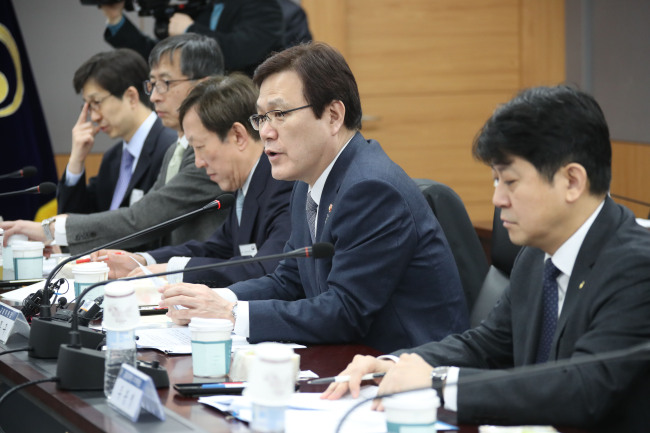South Korea’s Financial Services Commission announced Thursday a set of plans to strengthen corporate governance rules for financial firms here, mainly to tackle a lack of transparency in nomination processes for chiefs at local banking firms.
The plans to revise the Act on Corporate Governance of Financial Companies, to be proposed by June, aim to prohibit the incumbent chief of a financial firm from joining an internal committee to nominate outside directors. It would also obligate outside directors to make up over two-thirds of the committee.
If an outside director of a financial firm serves more than a second term, the firm will be required to carry out an external screening for the person’s eligibility, according to the plans. A financial firm will also be mandated to disclose to the public a set of requirements for its new chief executive before the nomination of a new CEO takes place.
Rights to engage in a nomination process for external directors or CEO will also be given to minor shareholders who hold shares with face value of at least 100 million won ($93,800) as of the previous quarter. Currently, the rights were recognized only for those with an at least 0.1 percent share.

FSC Chairman Choi Jong-ku (Yonhap)
“The incumbent executives’ influence in the nomination process of the CEOs and outside directors (of a financial company) is at an extraordinarily high level,” Choi Jong-ku, chairman of the FSC, said in a meeting with representatives of financial industries and experts Thursday.
“Independence has not been secured in nominating outside directors, and the directors fell short of playing a proper role in placing checks and balances in executives’ actions.”
The remarks came immediately after a Thursday release by the Financial Supervisory Service, an agency under the oversight of the FSC, which pointed to the “opacity” of the nomination process of directors and chief executives at nine local financial groups. They said that such practices would exaggerate the influence of the executives and therefore heighten the chances of outside directors succumbing to the role of a yes-man.
Financial watchdogs and labor unions have asserted that such governance structure makes a nomination committee for a new head susceptible to influence by the incumbent CEO.
They have often criticized reappointments of CEOs to their next terms as “self-reinstating.”
Hana Financial Group Chairman Kim Jung-tai, who recently won his third term, has faced a barrage of criticisms for the way he was reappointed. It was pointed out, for instance, that for his second term in 2015, Kim was the only inside director of the seven-member nomination committee, with the other six being external directors. Kim was a single candidate.
In December 2017, Hana revised an internal regulation on its chief nomination committee, so that the committee was solely made up of external directors. But labor union’s backlash persisted, as the directors with voting rights had all been nominated by another committee that included Kim.
KB Financial Group Chairman Yoon Jong-kyoo had faced similar criticism in late 2017, before serving his second term as head of the financial group.
The FSC expects the revision to take effect in the first half of 2019. Introduced in 2016, the law to ensure the transparency of financial firms’ corporate governance structure was implemented the following year.
Meanwhile, the FSC did not include a plan in the package to mandate at least one outside director to be recommended by labor unions.
Aside from revisions centering on nomination committees, the FSC suggested other ways to improve the corporate governance of financial firms.
Controlling shareholders of financial firms will be subject to tighter rules, while a broader range of “major shareholders” will be brought under eligibility screening by the watchdog to ensure transparency of firms. The current law stipulates that the largest shareholder is the only one subject to the screening.
For example, to assess the eligibility of Samsung Life Insurance’s major shareholders, the financial oversight body will look into not only the largest shareholder, Samsung Electronics Chairman Lee Kun-hee, who has 20.76 percent of shares, but also other related parties, including Samsung Electronics Vice Chairman Lee Jae-yong, who holds a 0.06 percent stake.
Also, a financial firm will be required to disclose information about executives who are paid an annual salary of over 500 million won or a performance bonus of a combined 200 million won a year.
By Son Ji-hyoung
(
consnow@heraldcorp.com)






![[Graphic News] More Koreans say they plan long-distance trips this year](http://res.heraldm.com/phpwas/restmb_idxmake.php?idx=645&simg=/content/image/2024/04/17/20240417050828_0.gif&u=)